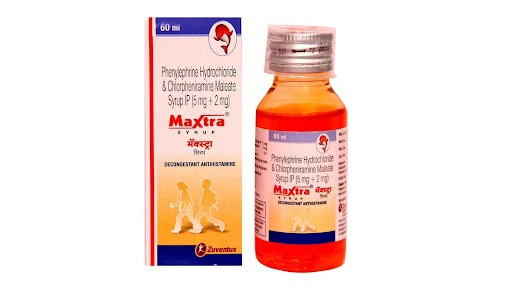
If you are a parent or other caregiver, you are aware of how difficult it may be to see your child experience the symptoms of a cold, including runny nose, congestion, and sneezing. With Maxtra Syrup’s unique mix, these sensations can be relieved, enabling your kid to feel more at ease and sleepy throughout their sickness.
The active components in Maxtra Syrup are usually a mixture of paracetamol, chlorpheniramine, and phenylephrine. These components combine to lessen nasal congestion, suppress cough, and relieve fever and pain associated with colds, all of which help to relieve common cold symptoms.
We will discuss the applications, recommended dosage, and possible adverse effects of Maxtra Syrup. This guide strives to provide you with the information you need to make decisions about your kid’s health, whether you’re a caregiver seeking advice on administering medication or a parent seeking information on how to care for your child during a cold.
Maxtra Syrup
The main purpose of Maxtra Syrup is to help kids with common cold symptoms. By constricting enlarged blood vessels in the nasal passageways, it helps lessen nasal congestion and facilitates your child’s breathing. Furthermore, Maxtra Syrup reduces fever, eases body aches, and suppresses cough, making your kid feel more at ease and asleep throughout their illness.
Dosage Guidelines
It’s important to give your child Maxtra Syrup according to the dosage recommendations on the drug label or as provided by your healthcare practitioner. The age, weight, and severity of your child’s symptoms may all affect the dosage. Maxtra Syrup is usually taken orally every 4 to 6 hours, depending on your child’s response and tolerance to the drug. Doses can be changed as necessary.
To guarantee precise Maxtra Syrup dosing, a suitable measurement tool, such as a dosing syringe or cup, must be used. Do not use kitchen spoons as they might not give precise measurements.
Side Effects of Maxtra Syrup
Although Maxtra Syrup is generally regarded as safe when used as prescribed, certain children may experience adverse effects. The following are typical Maxtra Syrup adverse effects:
- Tiredness or lightheadedness
- vomiting or feeling queasy
- Parched throat or mouth
- Headache
- Diarrhoea or upset stomach
Most of the time, these side effects are mild and transient; however, if they worsen or continue, speak with your healthcare professional for more advice. Rarely, Maxtra Syrup may cause more severe side effects, like allergic reactions or liver damage. Seek medical assistance right away if your kid exhibits symptoms such as rash, itching, swelling, difficulty breathing, and yellowing of the skin.
Precautions and Considerations
It is important to take the following measures into consideration before giving your child Maxtra Syrup:
- Any medical conditions your child may have, such as allergies, asthma, kidney or liver illness, or high blood pressure, should be disclosed to your healthcare professional.
- Any additional drugs or supplements your child is taking should be disclosed since Maxtra Syrup may interact with them.
- Don’t give Maxtra Syrup to babies without first talking to a doctor.
- Children who have specific medical illnesses or risk factors should be given Maxtra Syrup with caution as they may be more vulnerable to adverse effects.
To avoid unintentional consumption, Maxtra Syrup must also be kept out of children’s reach and stored at room temperature, away from light and moisture.
Maxtra Syrup And Online Medicine Delivery
The rise of online pharmacies has made managing colds in children easy. While searching for an online medical store on the web, you might get many options for medicine apps. These apps allow you to order medicine online easily from the comfort of your home and provide great discounts, making an online medicine order a wonderful experience. You can order Maxtra Syrup from these medicine apps, but try ordering from a reputable online pharmacy that has good reviews and a track record.
Takeaway
Maxtra Syrup is a valuable medication for managing common cold symptoms in children. With a thorough grasp of Maxtra Syrup’s applications, dose recommendations, possible adverse effects, and safety measures, you may utilize it to help your child feel better while they’re sick. As usual, if you have any questions or concerns regarding giving your kid Maxtra Syrup, get in touch with your healthcare professional.







